Latest press releases
A selection of stories from across the Federation

Netherlands
Rutgers triumphs in landmark court case against lies, online hate and disinformation
Rutgers, the Netherlands’ leading sexual and reproductive health expert and IPPF’s Member Association, has today secured a landmark legal win against an ultra-conservative group.
For media enquiries

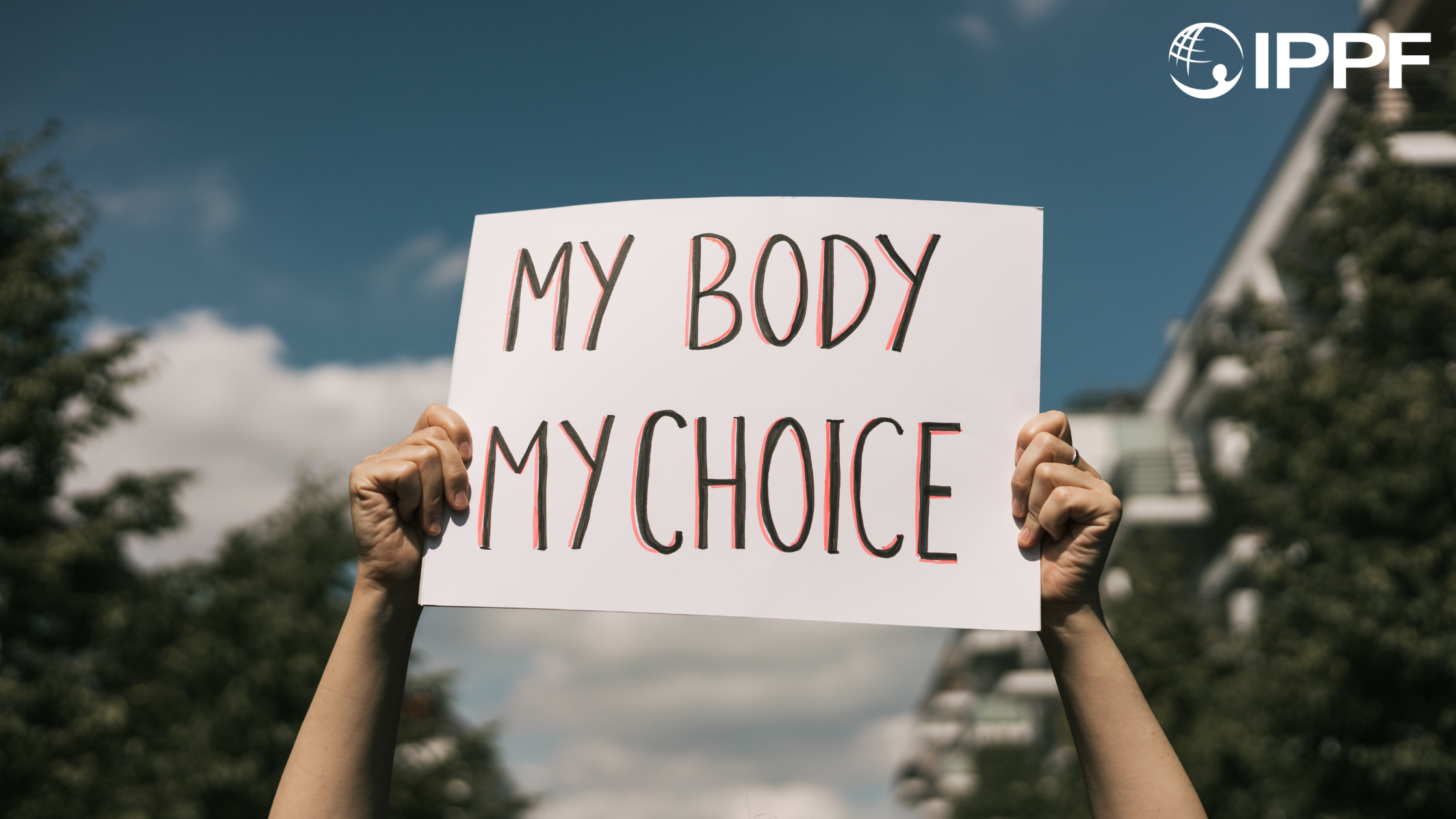
| 11 April 2025
CPD58 - Statement on behalf of the International Sexual and Reproductive Rights Coalition (ISRRC)
Every day, over 700 women and girls die - one every two minutes, from preventable causes related to childbirth and pregnancy. Despite this stark reality, this week, a small minority of states tried to sabotage UN negotiations to push an anti-rights and anti-health agenda on the world. From April 7th to 11th 2025, the 58th session of the Commission on Population and Development (CPD) took place with the theme of “Ensuring healthy lives and promoting well-being for all at all ages”. Governments from all over the world came together in a moment of global health crises to address persistent and continued threats that jeopardize the health and wellbeing of all women and girls worldwide. This UN process is a critical space where governments, UN agencies, civil society and young people come together to discuss priorities and make shared commitments on sexual and reproductive health and rights. For over 30 years, governments have agreed on standards for access to health services for women and girls. A very small minority of vested interests are determined to use this convening to attack the Sustainable Development Agenda. We refuse to allow the malicious undermining of hard won gains that impact the lives of millions of women and girls around the world.As recently as last year, governments from all regions of the world reached an agreement to reaffirm these shared goals and commitments. This week, in the face of efforts to sabotage the discussions and negotiations, a vast majority of countries have stepped up to hold the line on the right to health, especially of all women and girls. This disruptive behaviour from a very small minority of extremist anti-rights administrations, is not just a threat to the agenda being discussed today, but also for international cooperation on human rights and sustainable development at large. They are preventing the international community from moving forward and making progress for people’s health, rights and well-being.
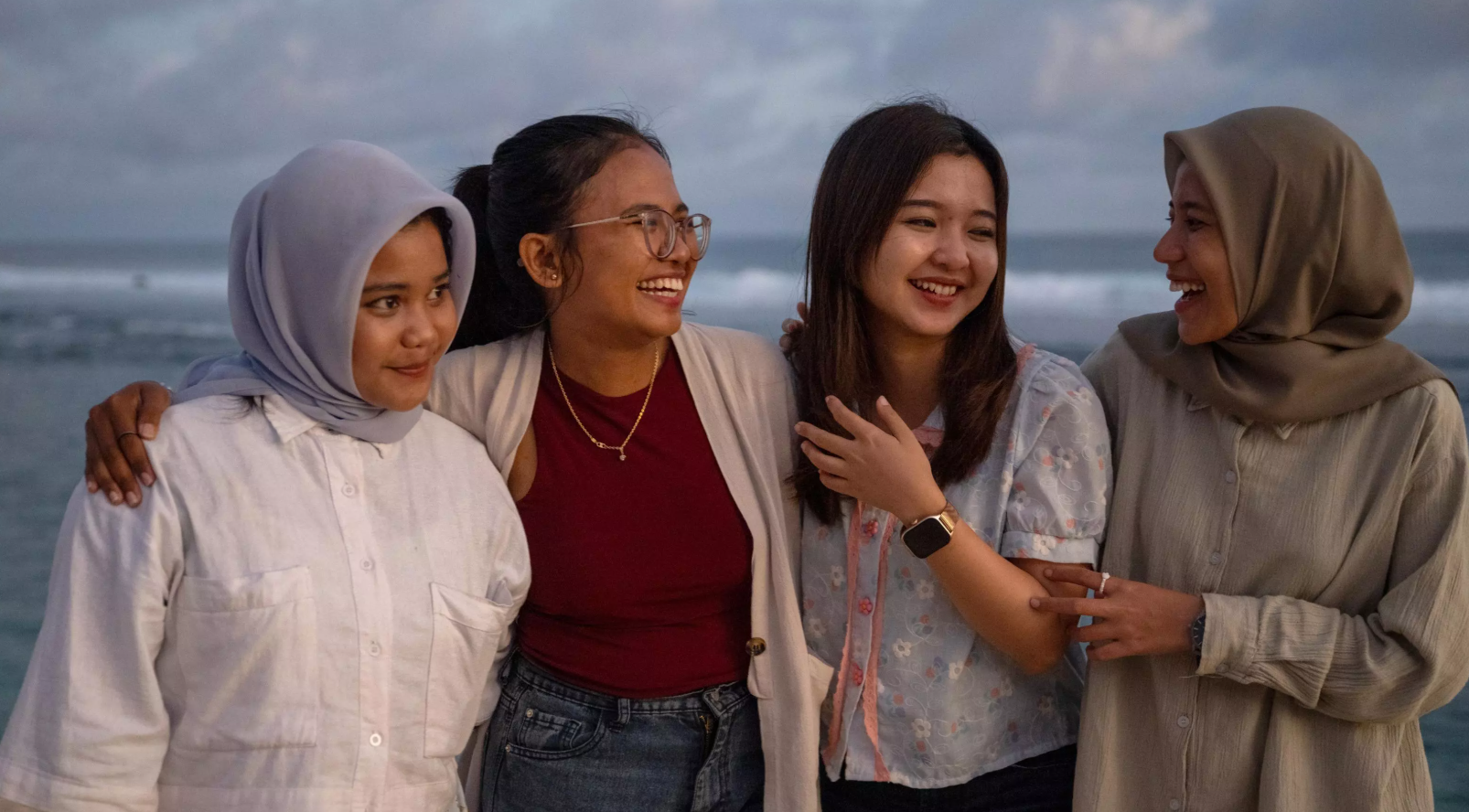
| 10 March 2025
The Commission on the Status of Women Adopts by Consensus the Political Declaration
IPPF welcomes the political declaration adopted by the Commission on the Status of Women (CSW). As we are marking 30 years after the Fourth World Conference on Women in Beijing in 1995, UN Member States need to urgently accelerate the work to achieve their commitments to advancing the rights of all women and girls, especially in light of the current global pushback against fundamental human rights. IPPF welcomes the adoption of the Political Declaration on the occasion of thirtieth anniversary of the Fourth World Conference on Women and adoption of the Beijing Declaration and Platform for Action, in which Governments reaffirm their commitment to accelerate action to achieve gender equality and the empowerment of all women and girls. IPPF actively engaged in the process by providing technical inputs to Member States and raising awareness of the situations of women, girls and the most marginalized communities and bringing their real-life experiences into the conversation. The geopolitical backdrop to this year’s negotiations was extremely divided, with key issues such sexual and reproductive health and rights, multiple and intersecting forms of discrimination and even the most basic agreed terms around gender equality being challenged. Following the extensive and challenging political negotiations, the consensus adoption of this political declaration underscores strong cross-regional support for the human rights of all women and girls, the Commission’s mandate, the priority theme and the multilateral system. The true impact of this political declaration will be measured by its implementation at the national level. As a locally rooted yet globally connected Federation, IPPF and its Member Associations are uniquely positioned to drive the implementation of the political declaration across national, regional, and global spheres. By doing so, we can ensure meaningful change in the lives of women, adolescents, girls, and other marginalized communities where it matters most. As we mark the 30th anniversary of the Beijing Declaration and Programme of Action and find ourselves only 5 years away from the 2030 deadline for the UN Sustainable Development Goals (SDGs), no States are on track to achieve gender equality. Women, girls and marginalized communities continue to suffer disproportionally from lack of equality and have their fundamental human rights undermined every day, with grave consequences. In this current political moment, where governments are cutting funding and scale back support for basic lifesaving assistance for the most vulnerable, the renewed political commitment of governments with the adoption of the Political Declaration to accelerate the fulfilment of rights of all women and girls is an important step. It is now crucial to collectively hold governments accountable for their commitments. IPPF particularly welcomes the inclusion of: strong references to human rights of all women and girls, reflecting Member States’ unwavering commitment to strengthen their collective efforts toward the full, effective, and accelerated implementation of the Beijing Agenda, including ensuring the full enjoyment of women’s and girls’ human rights. The reaffirmation of the need for gender-responsive budgeting and gender-responsive implementation of the 2030 Agenda, which is crucial for addressing structural inequalities. The reference to multiple and intersecting forms of discrimination in the text, since women, adolescents, girls, and marginalized groups who experience multiple and intersecting forms of discrimination, are more likely to be structurally excluded. It is therefore important that the text recognizes the challenges in achieving gender equality for these groups. A strong paragraph on the right to health for women and girls throughout their life course, including a reference to Universal Health Coverage: The commitment to ensure that victims of and survivors of sexual and gender-based violence and sexual violence in conflict have prompt and universal access to quality social and health care services and access to justice. The commitment to addressing the risks and challenges emerging from the use of technologies, with full respect for the human rights of all women and girls, both online and offline, and that gender-perspective should be mainstreamed in policy decisions and frameworks that guide the development of digital technologies, including artificial intelligence The strong recognition of the role of women and girls in the resolution of armed conflicts, peacebuilding and post-conflict reconstruction. We are pleased that the important contributions of civil society are acknowledged, however, we regret that the Declaration does not explicitly reference Women Human Rights Defenders (WHRDs), whose work is fundamental in advancing gender equality and human rights. However, IPPF is disappointed that language on the importance of sexual and reproductive health and rights (SRHR) as a fundamental component for achieving gender equality was ultimately not included in the Political Declaration, which significantly weakens the text’s scope, as SRHR is fundamental to the lives of women, adolescents, and girls. Furthermore, despite overwhelming data and research demonstrating the benefits of investing in adolescent girls, this critical group remains underrepresented in the Political Declaration. IPPF urges all governments to unite behind this crucial call to action. Three decades after the Beijing Conference and the adoption of the Beijing Declaration and Platform for action, the world faces new and complex challenges to achieving the most fundamental human rights for all, which is further exacerbated by persistent structural inequalities. It is imperative that we act with ambition, courage, and determination to uphold the legacy of Beijing. Looking ahead, we call on the global community to embrace a bold and transformative agenda that secures the rights and well-being of all women, adolescents, and girls and the most marginalized communities—not only for today but for the generations to come. For more information, please contact [email protected] - +44 7918 845944 About the International Planned Parenthood Federation IPPF is a global healthcare provider and a leading advocate of sexual and reproductive health and rights (SRHR) for all. Led by a courageous and determined group of women, IPPF was founded in 1952 at the Third International Planned Parenthood Conference. Today, we are a movement of 158 Member Associations and Collaborative Partners with a presence in over 153 countries. Our work is wide-ranging, including comprehensive sex education, provision of contraceptive, safe abortion, and maternal care and responding to humanitarian crises. We pride ourselves on being local through our members and global through our network. At the heart of our mission is the provision of – and advocacy in support of – integrated healthcare to anyone who needs it regardless of race, gender, sex, income, and crucially no matter how remote. Photo credits: IPPF/Hannah Maule-ffinch/Indonesia
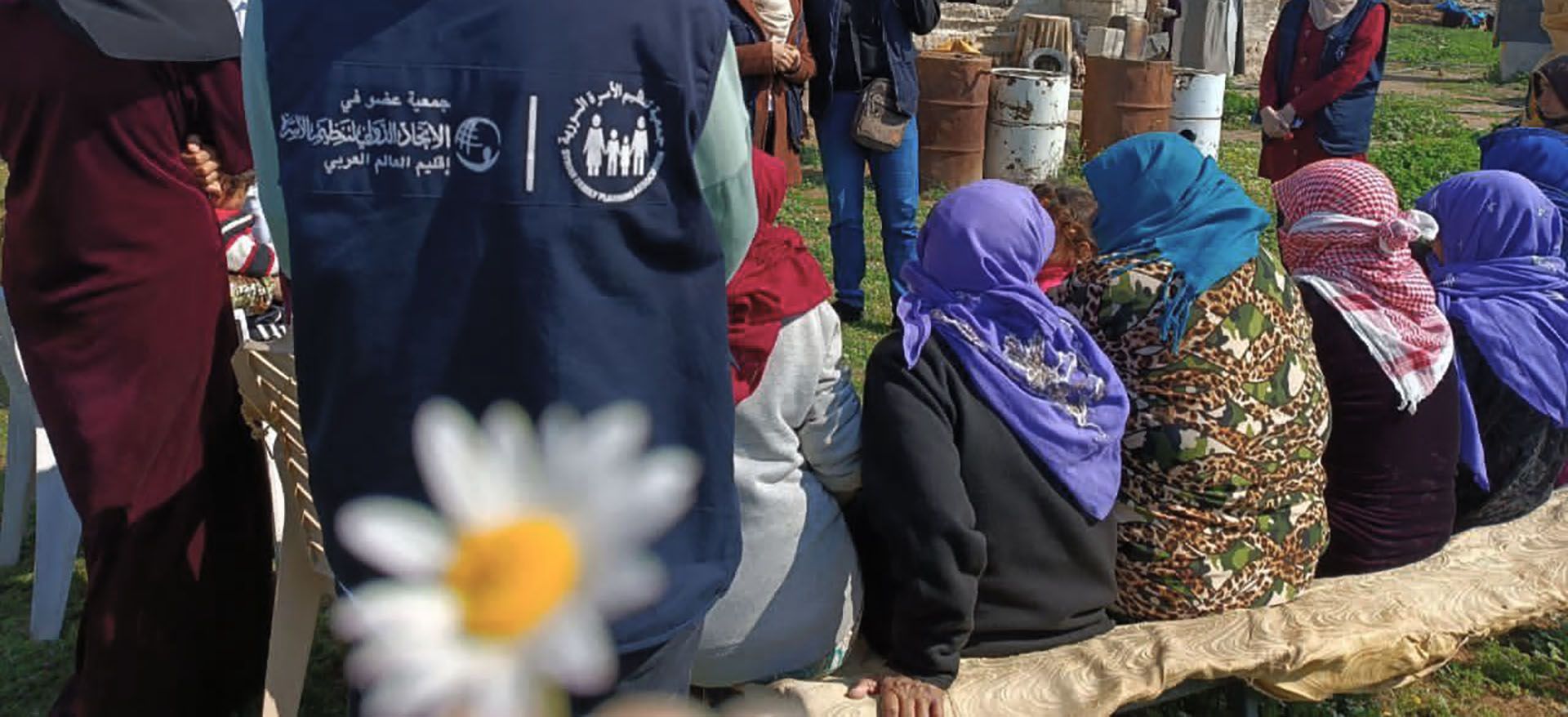
| 11 December 2024
We Must Protect Critical Sexual and Reproductive Health and Rights During Syria's Transition
IPPF remains steadfast in its commitment to supporting its Member Association, the Syrian Family Planning Association (SFPA), in providing essential SRHR services for all. Within the uncertainty and instability, we continue to work together with SFPA to empower communities, protect the rights of women and adolescents, and address the urgent needs of marginalized populations, particularly in the face of increased vulnerability. Our collective mission stands firm: we are committed to ensuring that dignity, health, and choice are accessible to all, regardless of political or social challenges. Even in these uncertain times, we believe that SRHR services must continue - because the need for family planning, maternal healthcare, and gender-based violence (GBV) support does not diminish, even in the midst of conflict. Syria is enduring a difficult period of transition, but sexual and reproductive health cannot be sidelined. The health and well-being of Syria’s most vulnerable populations, especially women and youth, remain a top priority. The work of SFPA is more essential than ever, as it continues to provide vital services such as family planning, postnatal care, and GBV screening. At Al-Hasakah, SFPA is on the frontlines, directly supporting over 5,000 people, the majority of whom are women in urgent need of reproductive healthcare services. These women face an increased risk of complications due to the lack of access to safe and comprehensive health services, but SFPA is committed to meeting their needs. From providing postnatal care to offering family planning options and GBV screenings, SFPA is ensuring that women in these vulnerable circumstances are not forgotten. SFPA’s clinics, such as the one in southern Daraa and the besieged Al-Waer in Homs, have become lifelines, serving as a beacon of hope for those in need. They provide up to 70 beneficiaries a day with crucial services, including health counselling and early marriage awareness. SFPA has faced significant challenges, including the seizing of vehicles and temporary clinic closures in the suburbs of Homs. Yet SFPA's perseverance in delivering SRHR services remains an essential lifeline for the people of Syria. We will continue to stand alongside SFPA in their tireless efforts to safeguard sexual and reproductive health rights, ensuring that every woman, adolescent, and marginalized person has access to the care they deserve. Together, we stand for dignity, health, and choice, even in the face of uncertainty. The challenges are great, but the importance of maintaining SRHR services is immeasurable. Through unwavering dedication, we can support those in need and contribute to a future where everyone has access to the care and rights they deserve. Contact: +44 7918 845944 Image credit: SFPA/Wasim Kashlan

| 25 July 2024
Missed opportunity by the European Court of Human Rights to guarantee rights of sex workers
25 July 2024 – The International Planned Parenthood Federation (IPPF) laments the missed opportunity by the European Court of Human Rights (ECHR) to ensure that the human rights of sex workers are respected, protected and fulfilled by all European Member States, in accordance with the European Convention of Human Rights. The ruling comes after 261 sex workers, many of them migrants and/or gender minorities, filed a complaint to the ECHR in December 2019 to challenge the French Prostitution Law 2016, upheld by the French Constitutional Court earlier in 2019, which criminalizes the clients of sex workers and led to human rights violations of the sex workers. IPPF and its Member Association in France, Le Planning Familial, were among the numerous communities, health, human rights and feminist organizations that supported the sex workers’ application to the ECHR, noting the extreme deterioration in the living and working conditions of sex workers since the criminalization of clients came into force. We are disappointed that the ECHR has chosen to neglect its duty to ensure the protection of human rights of all people, without discrimination. In doing so, the leading human rights norms and standards on sex workers rights remain in the recommendations of the major UN agencies including the World Health Organization, UNAIDS and the UNDP, as well as by major international human rights organizations such as Amnesty International, the International Lesbian, Gay, Bisexual, Trans, and Intersex Association (ILGA) World, Human Rights Watch, and Transgender Europe, as well as IPPF. The court’s decision was an opportunity for the European region to establish a precedent in human rights jurisprudence that reaffirms what sex workers themselves have demanded for decades: that sex workers are entitled to the respect, protection and fulfillment of their human rights, free from discrimination, including the right to privacy and autonomy, the right to be free from violence and discrimination, and the rights to physical integrity and life. Micah Grzywnowicz, Regional Director of the IPPF European Network, said: “Rather than seizing a critical opportunity to protect human rights, we are disappointed that the European Court of Human Rights has instead deferred the issue to legislatures, despite recognition that the Swedish Model infringes on sex workers rights. Rather than ensuring the human rights of sex workers in Europe are guaranteed by States, their human rights are now dependent on their geographic location and the country in which they live. Strong evidence demonstrates that criminalization laws have negative consequences for sex workers and their families, and lead to violations of their human rights. We are disappointed that the voices, human rights, and autonomy of sex workers have been deferred by a Court established exactly for the purpose of guaranteeing the human rights of all people, without discrimination.” In 2022, IPPF adopted a Sex Work Policy which focuses on evidence-based policies which best respect, protect and fulfill the human rights of sex workers. Informed by the lived experiences of sex workers globally, our policy strongly supports decriminalization, together with social policies that address structural inequalities that manifest in all areas of society including sex work. Notably, the policy notes that “widespread criminalization, stigma and discrimination not only violate their human rights to live free from violence and discrimination, the right to health, and sexual and reproductive rights, but also limit sex workers’ capacity to self-organize, access funding for service provision and advocacy, and meaningfully engage with civil society organizations (including unions) and policymakers.” It is essential that we stand with sex workers to support their continued advocacy to be free from discrimination and exercise their human rights. IPPF stands in solidarity with all sex workers around the world and calls on all governments to take immediate steps to guarantee sex workers’ human rights. For media inquiries please contact [email protected] About the International Planned Parenthood Federation The International Planned Parenthood Federation (IPPF) is a global healthcare provider and a leading advocate of sexual and reproductive health and rights (SRHR) for all. We are a movement of 150 Member Associations and Collaborative Partners with a presence in over 146 countries. Building on a proud history of 70 years of achievement, we commit to lead a locally owned, globally connected civil society movement that provides and enables services and champions sexual and reproductive health and rights for all, especially the under-served. We advocate for a world where people are provided with the information they need to make informed decisions about their sexual health and bodies. We stand up and fight for sexual and reproductive rights, and against those who seek to deny people their human right to bodily autonomy and freedom. We deliver care that is rooted in rights, respect, and dignity - no matter what.

| 12 July 2024
Landmark Decision: UN Human Rights Council Adopts First-Ever Resolution with Reference to Sexual Rights
Geneva, 12 July 2024 – The 56th Session of the Human Rights Council concluded today with major advancements for women and girls’ human rights, including the first ever reference to sexual and reproductive health and rights in a negotiated document—which was adopted by consensus. For the first time in UN history, a resolution refers to the full formulation of “sexual and reproductive rights. The resolution, “Human rights in the context of HIV and AIDS,” urges states to address the specific needs of adolescents and young persons, especially girls and young women, and persons with disabilities in the response to HIV, and “to develop (...) sexual and reproductive health services, as well as education programmes on sexual and reproductive health and rights.” It is also the first resolution on HIV adopted by consensus since 2019. In contrast to previously agreed language on ‘sexual and reproductive health and reproductive rights’, the inclusion of ‘sexual rights’ ensures that young people will learn they have the rights to be free from sexual violence, from female genital mutilation, from marital rape, and that they have freedom to build safe, healthy relationships and families with the person they choose. “The language adopted today reflects one of the most highly significant advances on sexual and reproductive rights over the past 30 years at the UN. At a time of increasing attacks on freedom, human rights and bodily autonomy, the Human Rights Council has demonstrated that it is still fit for purpose to protect people’s human rights to live free from sexual violence,” says Estelle Wagner, IPPF’s Senior International Advocacy Adviser in Geneva. During the session, the HRC also adopted the resolution “Elimination of all forms of Discrimination against Women and Girls”, which urges states to repeal “all laws and policies that that criminalize or restrict the exercise of sexual and reproductive health and reproductive rights," in addition to reaffirming the right to bodily autonomy, sexual and reproductive health, reproductive rights, access to safe abortion, and comprehensive sexuality education. The resolution also addresses menstrual poverty for the first time in a UN resolution. New resolutions on Accelerating Progress to Prevent Adolescent Pregnancy, and Technology-Facilitated Gender-Based Violence were also adopted during this session, as well as an updated resolution on Menstrual Hygiene Management, Human Rights and Gender Equality, which took a stronger health and humanitarian lens than the previous iteration. IPPF worked hand in hand with Member States and civil society partners to ensure progressive and inclusive language in these resolutions would have a meaningful impact on people’s everyday lives. In solidarity with women, girls and marginalized communities around the world who still face rights violations and significant barriers to enjoy their sexual and reproductive rights, IPPF remains committed to advancing human rights at all levels – from the UN to the local level where our Member Associations tirelessly fight for the sexual and reproductive health and rights of all individuals. We are united, we are strong, and we will not back down until all people can exercise their sexual and reproductive rights free from coercion, discrimination and violence. For media enquiries, please contact [email protected] About the International Planned Parenthood Federation The International Planned Parenthood Federation (IPPF) is a global healthcare provider and a leading advocate of sexual and reproductive health and rights (SRHR) for all. We are a movement of 150 Member Associations and Collaborative Partners with a presence in over 146 countries. Building on a proud history of 70 years of achievement, we commit to lead a locally owned, globally connected civil society movement that provides and enables services and champions sexual and reproductive health and rights for all, especially the under-served. We advocate for a world where people are provided with the information they need to make informed decisions about their sexual health and bodies. We stand up and fight for sexual and reproductive rights, and against those who seek to deny people their human right to bodily autonomy and freedom. We deliver care that is rooted in rights, respect, and dignity - no matter what.
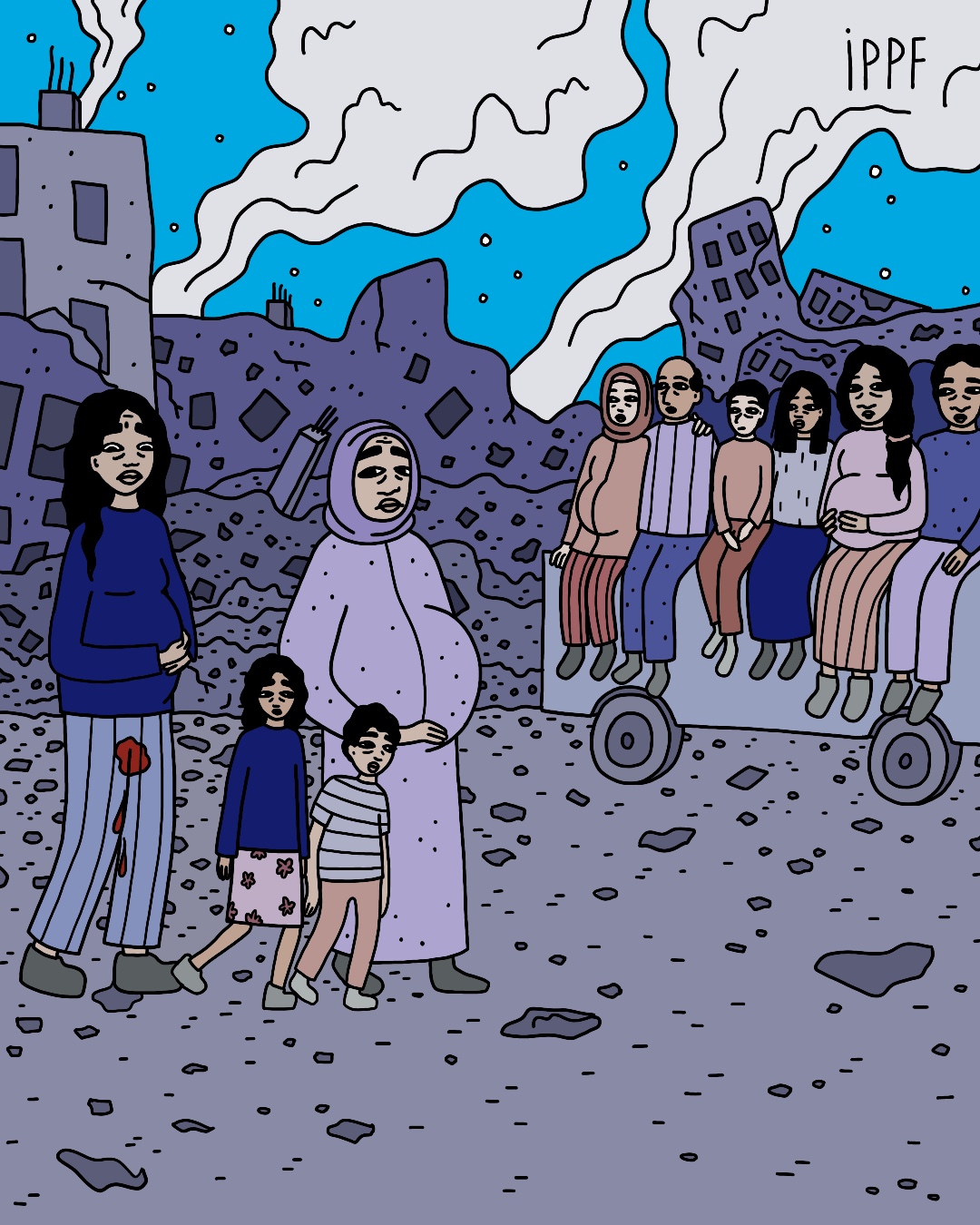
| 09 July 2024
Press Release: Gaza nine months on, pregnant women carry the burden of conflict
Jerusalem, 9 July 2024: Nine months on since the start of the Israeli aggression in Gaza, maternal healthcare is almost decimated. Pregnant, postpartum, and breastfeeding women in Gaza are facing serious health consequences. Miscarriages have risen at least 300% since October last year. One of our own health workers from the Palestinian Family Planning and Protection Association (PFPPA) recently lost her pregnancy due to the stress of the attacks. “I am a healthcare worker with PFPPA, and I have been forced to flee not once, not twice, but six times since the start of the violence, with my husband and three small children. Our home was destroyed by bombing. Whilst I was fleeing from one location to another, I started to unexpectedly bleed. I was able to find a doctor only after reaching Rafah, who confirmed I was miscarrying. I didn’t even realise I was pregnant,” Wafa, our healthcare worker in Gaza, told us. With the starvation being faced by the people in Gaza in addition to the lack of drinking water, our service providers are reporting on daily basis of pregnant women suffering from anaemia, malnutrition and in desperate need of prenatal vitamins and supplements. Our service providers in Gaza are also witnessing many women who are either having premature deliveries or miscarriages. Women of newborns are unable to breastfeed their babies due their own malnutrition and anxiety, while at the same time most families cannot afford milk formula as prices are becoming extremely high - and that is if they can find it in the market. When medical facilities are available, many women are unwilling to leave their shelters to obtain pre- and post-natal care, as they worry if they are separated from their families there will be military attacks and bombings and fear for their and their loved one's fate if they do so. Ammal Awadallah, Executive Director of PFPPA, said: “Nine months on, and a woman who conceived at the start of these hostilities will now be giving birth. But where, how, and what life is that baby entering? This will be a lost generation in Gaza, a generation born into genocide. We’re doing the best we can to offer support to women in Gaza, but the conditions to get aid into Gaza, let alone warehouse supplies, make our jobs extremely difficult. PFPPA has always been committed to women’s health and that doesn’t stop, now or ever.” Over 37,900 people have now lost their lives in Gaza. Women and girls that survive are facing a myriad of challenges; deprived of sexual and reproductive health services, sanitary and hygiene products. We believe every single person and organisation needs to mobilise to end this, by calling on their governments to demand unhindered humanitarian aid access, to demand a permanent ceasefire, and divest from any organisations aiding and abetting Israel’s military campaign against Palestine. We are working in close collaboration with colleagues in Palestine on how best to serve those caught up in the violence, to ensure health workers are safe and able to provide sexual and reproductive health care without threat to life. For more information and to speak to our Executive Director in Palestine, please email [email protected] About the Palestinian Family Planning and Protection Association Established in Jerusalem in 1964, the Palestinian Family Planning and Protection Association (PFPPA) is locally registered as an independent, non-profit and non-governmental association with headquarters in Jerusalem. PFPPA has service delivery points located in the West Bank Areas of Ramallah, Bethlehem, Hebron and Halhoul, in addition to one in the Gaza Strip, which has yet to be relocated after it was destroyed following an Israeli airstrike on 8 October. Furthermore, and in cooperation with local partners, PFPPA is also responsible for three safe spaces to provide Gender Based Violence (GBV) related services in the Jerusalem area. About the International Planned Parenthood Federation IPPF is a global healthcare provider and a leading advocate of sexual and reproductive health and rights (SRHR) for all. Led by a courageous and determined group of women, IPPF was founded in 1952 at the Third International Planned Parenthood Conference. Today, we are a movement of 150 Member Associations and Collaborative Partners with a presence in over 146 countries. Our work is wide-ranging, including comprehensive sex education, provision of contraceptive, safe abortion, and maternal care and responding to humanitarian crises. We pride ourselves on being local through our members and global through our network. At the heart of our mission is the provision of – and advocacy in support of – integrated healthcare to anyone who needs it regardless of race, gender, sex, income, and crucially no matter how remote.
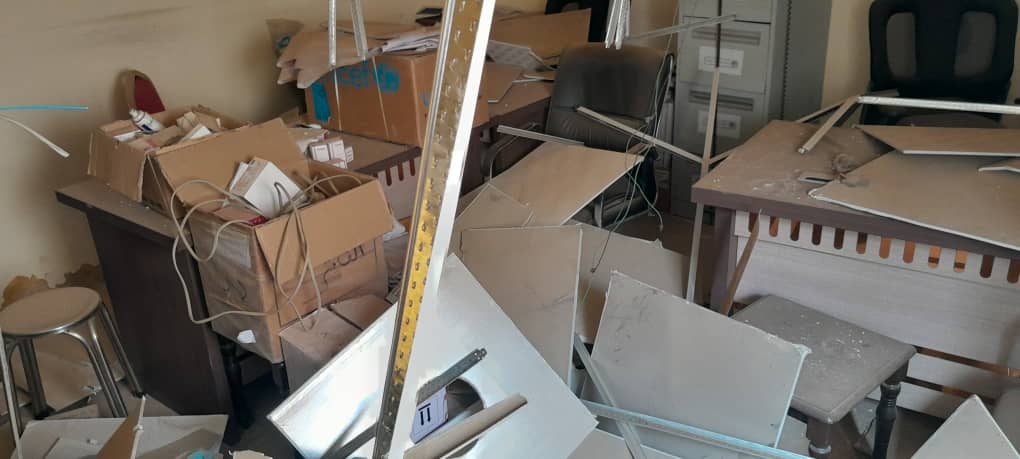
| 02 July 2024
Another of our clinics in Sudan has been attacked, one less safe place for women and girls to get sexual and reproductive healthcare
Haz click aquí para leer este posicionamiento en español. Khartoum, 2 July 2024: Another horrendous attack on one of our healthcare clinics in Sudan has occurred this week. Several staff and volunteers from our Member Association in Sudan, the Sudan Family Planning Association (SFPA), have now been injured or killed by the Rapid Support Forces (RSF). Our clinic in El Fasher has been destroyed, meaning there is one less option for women and girls to receive lifesaving sexual and reproductive healthcare in the region. For over a month, ongoing battles around El Fasher, the capital city of North Darfur, have been taking place.The RSF, who have stationed themselves 10 kilometres from the city, have been indiscriminately shelling military and civilian targets. One of our SFPA volunteers, Mahasen Abdul Jabbar, was killed after being hit by gunshot at the clinic. This morning, Dr Daifallah Mohammed, a volunteer family medicine specialist in our El Fasher clinic, also died as a result of the warfare. The RSF bombardments have also severely injured several of our staff: Dr Marwa, a doctor at the Integrated Centre in El Fasher, was hit by shrapnel in her leg. A midwife at Abu Shouk centre, Halima Abdullah Adam, was hit and four of her children were injured and evacuated. The house of the guard of Abu Shouk centre was hit, killing his daughter and wounding four of his other children. One of our nurses has been hit with shrapnel and has been transferred to hospital and is in critical condition and all contact with her has been lost. The RSF has also been kidnapping our patients, their whereabouts unknown. This latest attack is on top of previous attacks on our clinics in Sudan, which destroyed our facilities in Khartoum and El Fashir and health centres run by SFPA between 7-9 September 2023. Women and girls in Sudan are facing an upsurge in sexual and conflict-related violence. Our staff have witnessed firsthand the impact of this heinous crime on the most vulnerable people, including women, girls and other marginalized groups. We previously reported that rape victims and survivors are struggling to obtain contraception, abortion medication and post-exposure anti-viral medications. They face severe and life-threatening consequences, including loss of family support and homes and shelters and increased risk of suicide. Survivors are afraid to seek medical treatment because of the stigma and fear of reprisals from rape. Fadoua Bakhadda, Regional Director, Arab World Region, said: “We unequivocally condemn all violence against civilians, especially against health centers that are attacked while providing essential services to those in need. Such acts are an affront to humanity and the sanctity of care. The murders, displacement and destruction in Sudan must stop. It is vital that warring parties remember their obligations under International Humanitarian Law, which include ensuring the protection of civilians and the protection of health structures and health personnel.” Dr Alvaro Bermejo, Director-General of IPPF, said: “We are devastated to learn of another attack on one of our clinics in Sudan, and the injuries and loss of lives to our staff and volunteers. Healthcare facilities, and most importantly, healthcare workers, must never be the target of war. The sexual and reproductive health and lives of 800,000 people in North Darfur – including women, children, and people with disabilities – are hanging in the balance as bombing and shelling cause widespread harm to civilians and severely disrupt the essential health services they very much depend on. Now, more than ever, our healthcare facilities must be protected so they can continue to provide care to the populations enduring these needless attacks. Our clinic, which previously was able to provide lifesaving sexual and reproductive healthcare such as prenatal care and contraceptives, is gone. Where will women and girls seek these services now? There must finally be a critical mass of people of conscience saying enough is enough in this forgotten crisis.” For more information and to speak to one of our staff in North Darfur, Sudan, please email [email protected] About the Sudan Family Planning Association The Sudan Family Planning Association (SFPA) was established in 1965 by pioneers in obstetrics and gynaecology in response to increases in maternal, neonatal and infant mortality and morbidity. As the statistics show, Sudan is a country in great need of frontline sexual and reproductive health (SRH) services. Advocacy, and undertaking information, education and communication (IEC) programs are critical. In 2023, SFPA provided 38 million services through 25 clinics, 272 associated clinics, 39 mobile clinics, 1494 CBD/CBS, and digital/Virtual channels. Since the start of the crisis on 15 April 2023, the association teams were successful in providing 8 million services through 25 SDPs and 10 million services through non damaged associated and mobile clinics. SFPA was able to assist 1,183 deliveries under bombardment and provided 170 943 treatments of HIV in its static clinics. About the International Planned Parenthood Federation The International Planned Parenthood Federation (IPPF) is a global healthcare provider and a leading advocate of sexual and reproductive health and rights (SRHR) for all. We are a movement of 150 Member Associations and Collaborative Partners with a presence in over 146 countries. Building on a proud history of 70 years of achievement, we commit to lead a locally owned, globally connected civil society movement that provides and enables services and champions sexual and reproductive health and rights for all, especially the under-served. We advocate for a world where people are provided with the information they need to make informed decisions about their sexual health and bodies. We stand up and fight for sexual and reproductive rights, and against those who seek to deny people their human right to bodily autonomy and freedom. We deliver care that is rooted in rights, respect, and dignity - no matter what.
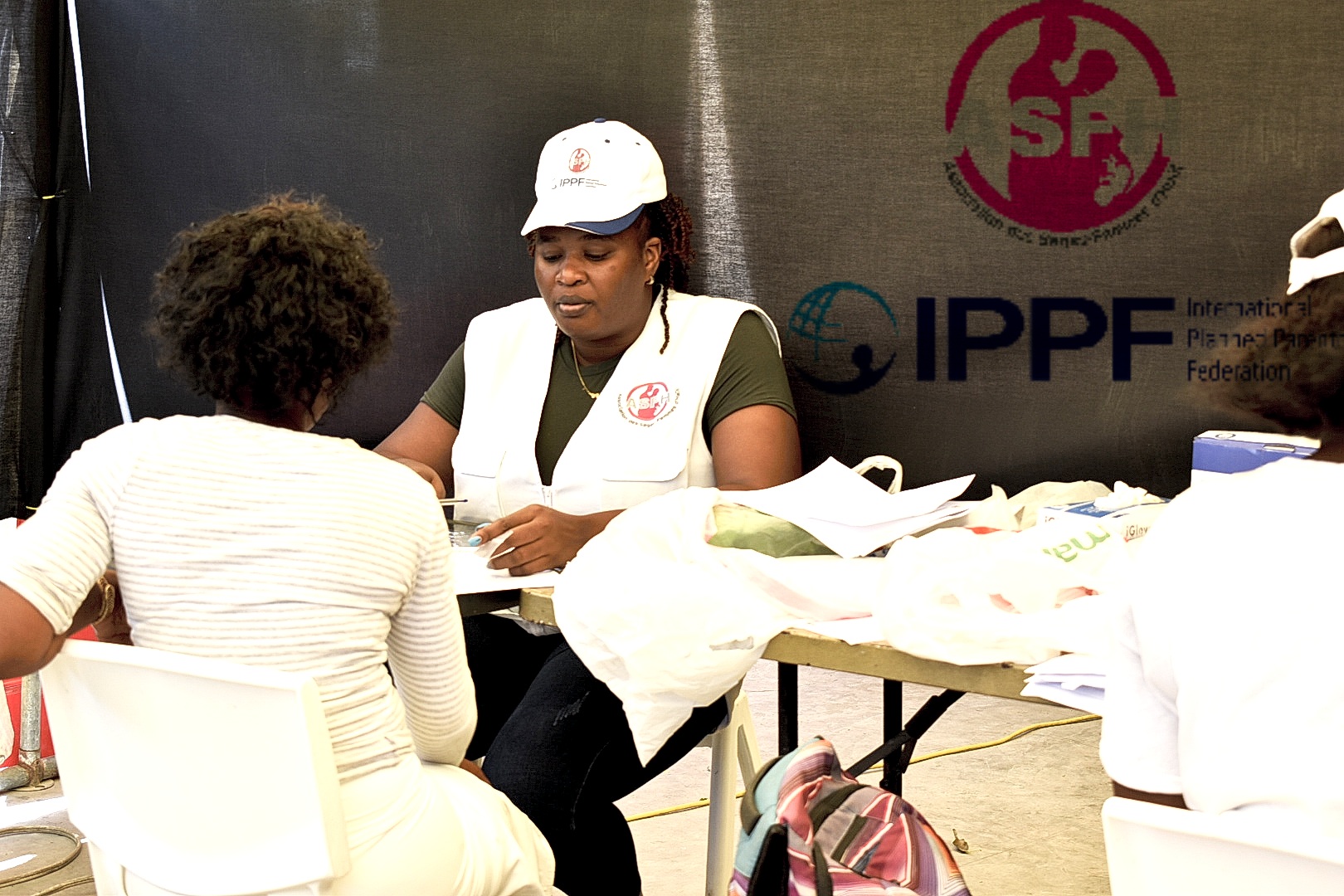
| 19 June 2024
IPPF Statement on the Ongoing Violence in Haiti
Haz click aquí para leer este posicionamiento en español The International Planned Parenthood Federation (IPPF) is deeply concerned about the escalating violence and political instability in Haiti, particularly its disproportionate impact on women and girls since March 2024. This crisis is expected to leave 3,000 pregnant women without essential medical care, leading to nearly 450 women experiencing life-threatening childbirth complications. With almost 580,000 Haitians displaced, women and girls are experiencing an alarming surge in sexual and gender-based violence (SGBV), including rampant sexual assaults, torture, and collective rape by armed groups. From January to March 2024, there were 1,793 SGBV incidents reported. Conflict-related insecurity has also significantly increased negative coping mechanisms, contributing to the rise in SGBV, as well as sexually transmitted infections and HIV. The ongoing violence is preventing access to essential sexual and reproductive healthcare services, endangering the lives of mothers and newborns. Our partner in Haiti, the Haiti Midwives Association, informed us, ‘the gangs prohibit the movement of motorcycles and pedestrians, threatening and sometimes shooting in the air to terrorise us further. Due to these difficult conditions, fewer and fewer patients are attending the hospital, whether for prenatal consultations, deliveries or postnatal care.” This inaccessibility has led to a significant increase in maternal and infant mortality. Eugenia López Uribe, Regional Director of the IPPF Americas & the Caribbean, said, “Humanitarian aid must be granted access through local organisations, such as our partner the Haiti Midwives Association, and their wellbeing must be guaranteed in this process. Women and girls can no longer wait! Our partner has provided access to vital emergency services such as pregnancy, childbirth and postpartum care, as well as care after sexual violence for 20 years. However, since February, they have been forced to stop their activities because of the imminent risks they face as women living in Port-au-Prince and surrounding areas.” On this International Day for the Elimination of Sexual Violence in Conflict, IPPF calls for zero tolerance toward any form of SGBV and demands the immediate protection of Haitian women, children, and those most at risk. We strongly call for unhindered humanitarian access to allow aid into Haiti. This aid must be designed and controlled by local NGOs and aid workers, and any foreign peacekeepers must safeguard and protect local communities - in particular their sexual and reproductive rights - so mistakes of the past are not repeated. Let’s not forget: Haiti's poverty and instability has been shaped by decades of foreign occupation and colonialism. The international community owes Haiti more than mere condolences; they owe an unwavering commitment to a future where human rights, including sexual and reproductive health rights are respected and protected, and nobody is left behind.
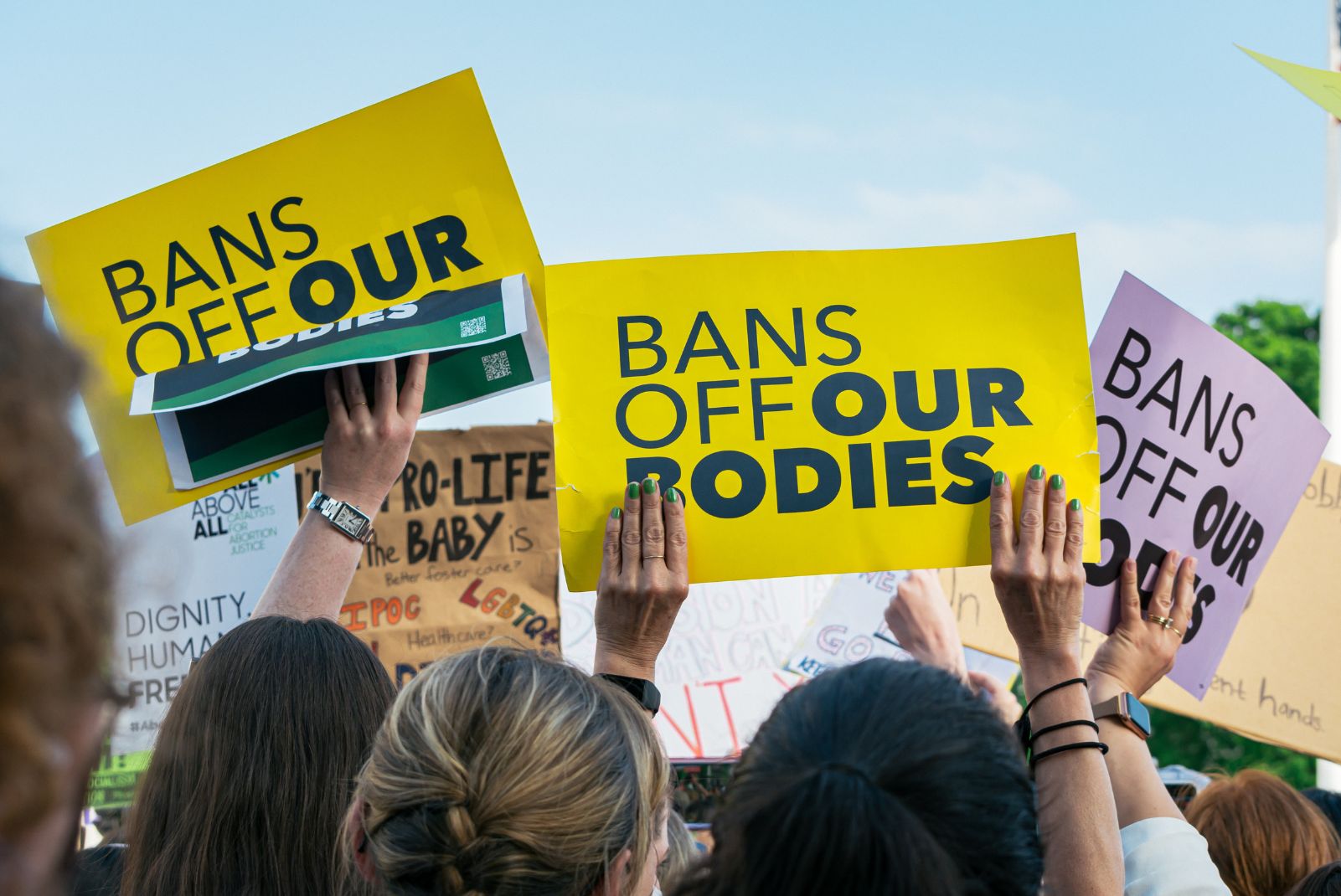
| 08 April 2023
Texas judge suspends approval of abortion pill in horror move for U.S abortion access
Texas judge, Matthew Kacsmaryk, has suspended the U.S. Food and Drug Administration's (FDA) approval of the abortion pill Mifepristone in a horror move for abortion access across the United States. The decision will result in a nationwide ban on Mifepristone in seven days, with the FDA given one week to appeal the ruling. While the ban also affected access in states that have secured abortion post-Roe v Wade, a conflicting ruling from Judge Thomas O. Rice from a federal court in Washington state ordered the FDA to maintain access to Mifepristone in 17 democratic states and Colombia District – effectively putting access to the pill into limbo. Mifepristone, which has been FDA-approved for more than 22 years and has a safety record of over 99%[i], is taken alongside the drug Misoprostol during medical abortion procedures. Since then, it has been used by over 5 million[ii] Americans and was used in more than half of abortions nationwide last year. While Misoprostol can be used alone in medical abortion, people should have access to the full spectrum of abortion care options. Mifepristone is also used in the medical management of miscarriage and second and third-trimester pregnancies when the fetus has died before birth. While the ruling does not prohibit the FDA from making a new authorization for Mifepristone, this will likely take many months. Severe disruption to abortion care services, healthcare services and supply chain issues are expected as healthcare providers and pharmacies grapple with legality, stock, retraining and reeducation. Beth Schlachter, Director of Global Advocacy for the International Planned Parenthood Federation, said: "For 22 years, Mifepristone has been safely used in medical abortion care across the U.S., allowing healthcare providers to deliver safe, practical and discreet care to people who have chosen to end their pregnancies, regardless of their economic status or ability to travel. "In one fell swoop, anti-abortion extremists have once again stripped people of their rights in another blow to liberty. This horror ruling based on junk science, wilful distortion of fact and extreme political agendas will profoundly affect the lives of millions of people already struggling to access the care they need, especially in states where abortion is already banned." Anti-abortion extremists deliberately filed the case against the approval of Mifepristone in the Amarillo division of the Northern District of Texas — a single-judge division where cases are automatically assigned to Judge Matthew Kacsmaryk, a conservative judge appointed by former President Trump. The group claim that: "the statutory basis on which the FDA's approval of Mifepristone was issued 22 years ago is invalid" - an assertion both the Government Accountability Office and FDA have previously investigated and put to rest "an 1873 vice law that made it illegal to send "obscene, lewd or lascivious" material through the mail applies to abortion pills" - federal courts have consistently ruled it doesn't apply to lawful abortions "the drug's original approval wasn't supported by evidence of safety and efficacy" — a claim that medical and policy experts have continuously discredited Beth Schlachter, added: "The implementation of a national ban on Mifepristone via a state court debunks one of the principal anti-abortion arguments in the Roe v Wade case - that the ruling curtailed state freedom and that abortion rights should be defined on a state-by-state basis. "This weaponization of federal courts by anti-abortion extremists proves just how dangerous the overturning of Roe v Wade is for everyday Americans, whose access to healthcare now lies in the hands of fanatical religious extremists determined to disrupt, harass and deceive until they end access to abortion care and long-held sexual and reproductive rights for good." The International Planned Parenthood Federation's local partner, the Planned Parenthood Federation of America, will continue to provide abortion care where safe and legal to do so. Those seeking medical abortion can also access care via AidAccess and WomenonWeb. At least two abortion networks, Trust Women and Whole Womans Health, have also announced that they will not immediately stop prescribing Mifepristone and will await a directive from the FDA – a move known as a conscientious provision which refers to providers who continue to provide care despite the legal parameters. Alongside its partner and other reproductive health organizations, IPPF will keep fighting for access to abortion care, freedom from stigma and freedom from criminalization until everyone, everywhere, is free to make choices about their sexuality and well-being. [i] https://www.plannedparenthood.org/uploads/filer_public/42/8a/428ab2ad-3798-4e3d-8a9f-213203f0af65/191011-the-facts-on-mifepristone-d01.pdf [ii] Ibid For media enquiries, please contact Karmen Ivey at [email protected] or [email protected] About the International Planned Parenthood Federation The International Planned Parenthood Federation (IPPF) is a global service provider and advocate of sexual and reproductive health and rights for all. For 70 years, IPPF, through its 118 Member Associations and seven partners, has delivered high-quality sexual and reproductive healthcare and helped advance sexual rights, especially for people with intersectional and diverse needs that are currently unmet. Our Member Associations and partners are independent organizations that are locally owned, which means the support and care they provide is informed by local expertise and context. We advocate for a world where people have the information they need to make informed decisions about their sexual health and bodies. We stand up and fight for sexual and reproductive rights and against those who seek to deny people their human right to bodily autonomy and freedom. We deliver care that is rooted in rights, respect, and dignity - no matter what.
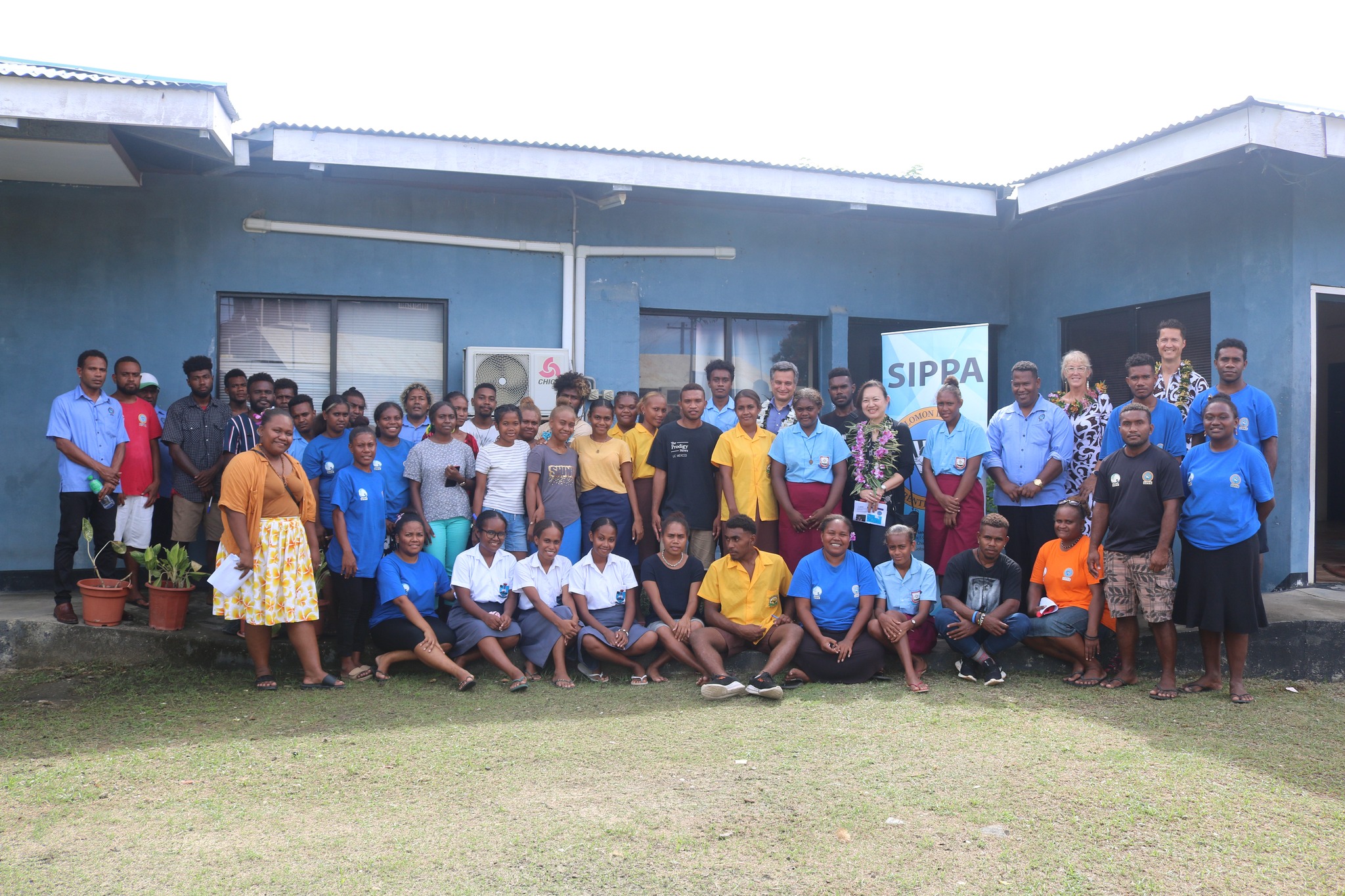
| 28 March 2023
IPPF’s Director General Visits Solomon Islands and Australia
The Director General of the International Planned Parenthood Federation (IPPF), Dr Alvaro Bermejo, is in Australia this week for high level meetings with Australian Government Ministers and the Australian Department of Foreign Affairs and Trade (DFAT). He is joined by Ms Tomoka Fukuda, Regional Director of IPPF’s East and Southeast Asia and Oceania Region (ESEAOR) and Ms Phoebe Ryan, IPPF’s Chief of the Australia and New Zealand Office. In Australia, Dr Bermejo has been privileged to meet with Australia’s Minister for International Development and the Pacific, the Hon Pat Conroy. Together, they discussed how Australia can play a leadership role in advancing sexual and reproductive health and rights through Australia’s international development cooperation. Last week, Dr Bermejo and Ms Fukuda visited IPPF’s Member Association in Solomon Islands, the Solomon Islands Planned Parenthood Association (SIPPA). In Solomon Islands, they witnessed SIPPA’s life-saving and critical work delivering sexual and reproductive healthcare on the ground, including mobile outreach in remote communities of Malaita Province. Australia has been a long-standing and critical partner to IPPF, supporting programming to reach women, girls, and marginalized groups across the development–humanitarian continuum around the world, with a particular focus on the Asia Pacific. In December 2022, IPPF and DFAT signed a new four-year global funding agreement for 2023 to 2026, part of which includes dedicated support to programming across the Pacific. AUD 19 million is dedicated as global funding towards the delivery of IPPF’s Strategy 2028, along with a further AUD 5.7 million to support the delivery of IPPF’s Pacific Niu Vaka Strategy, Phase 2. This generous investment will enable IPPF to reach an anticipated 1.8 million people in the Pacific over the next six years with 4.2 million essential sexual and reproductive services. IPPF is proud to stand alongside our Pacific MAs as they continue to advocate for the health and rights of those most underserved and excluded, reaching communities with essential information and high quality, person-centred sexual and reproductive health care. In 2021, IPPF reached over 72 million people around the world with more than 155 million sexual and reproductive health services and contributed to 121 policy and legislative changes in defence of SRHR. IPPF is grateful for Australia’s ongoing support in enabling this impact. IPPF’s Director General, Alvaro Bermejo shared: “IPPF are delighted to be working with the Australian Government to continue improving the sexual and reproductive health and rights (SRHR) of women and girls across the globe. We are grateful to them for helping us deliver more services and support at a time when inequalities are deepening, the opposition is growing, and humanitarian crises continue to place the lives of millions, particularly women and girls, at risk. As we look to build the future with our new strategy, continued support from global partners is crucial to achieving a world where everyone has access to sexual and reproductive healthcare. We hope DFAT’s strong global commitment will inspire other global leaders to take action.” For media enquiries, please contact Karmen Ivey on [email protected] or Phoebe Ryan on [email protected] About the International Planned Parenthood Federation The International Planned Parenthood Federation (IPPF) is a global service provider and advocate of sexual and reproductive health and rights for all. For 70 years, IPPF has delivered high-quality sexual and reproductive healthcare and helped advance sexual rights, especially for people with intersectional and diverse needs that are currently unmet. Our Member Associations and partners are independent organizations that are locally owned, which means the support and care they provide is informed by local expertise and context. We advocate for a world where people are provided with the information they need to make informed decisions about their sexual health and bodies. We stand up and fight for sexual and reproductive rights and against those who seek to deny people their human right to bodily autonomy and freedom. We deliver care that is rooted in rights, respect, and dignity - no matter what.
















